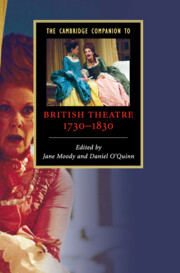Book contents
- Frontmatter
- Part I Performance
- Part II Genres
- Part III Identities
- 9 The making of an English audience: the case of the footmen’s gallery
- 10 Women playwrights
- 11 Entertaining women: the actress in eighteenth-century theatre and culture
- 12 Race and profit in English theatre
- Part IV Places of Performance
- Part V Further Reading
- Bibliography
- Index
- Series list
12 - Race and profit in English theatre
from Part III - Identities
Published online by Cambridge University Press: 28 May 2009
- Frontmatter
- Part I Performance
- Part II Genres
- Part III Identities
- 9 The making of an English audience: the case of the footmen’s gallery
- 10 Women playwrights
- 11 Entertaining women: the actress in eighteenth-century theatre and culture
- 12 Race and profit in English theatre
- Part IV Places of Performance
- Part V Further Reading
- Bibliography
- Index
- Series list
Summary
In the black
Ripe for analysis is the startling fact that from the 1770s to the 1830s London patent theatre managers stood a good chance - often, their best chance - of being in the black by staging plays including black characters, topics or settings. Isaac Bickerstaffe's comic opera The Padlock (DL, 1768), famous for introducing the first blackface comic figure on the London stage, received fifty-four performances in its first season, 142 in its first nine years and instituted Mungo, the character's name, as a byword in late eighteenth-century cultural discourse. George Colman the Younger's version of Inkle and Yarico was not only the most popular new play in the 1787-88 season, but ultimately became the sixth most popular London mainpiece during the years 1776-1800. John Fawcett's pantomime Obi; or, Three Finger'd Jack (HM, 1800), featuring the rebellious activity of the escaped Jamaican slave, Jack Mansong, ran for thirty-nine nights in a single summer, the longest single season run for any play at the Haymarket between 1777 and 1811. In 1807 Drury Lane mounted a Christmas pantomime entitled Furibond; or, Harlequin Negro which enjoyed twenty-eight performances. Then there is the remarkable series of adaptations of Aphra Behn's Oroonoko that together comprise the second most frequently produced drama in the eighteenth century, beginning with Thomas Southerne's Oroonoko (DL, 1695) and including plays by John Hawkesworth (DL, 1759), Francis Gentleman (Edinburgh, 1760; DL, 1769) and an unstaged adaptation by Dr John Ferriar entitled The Prince of Angola (1788). Isaac Bickerstaffe's Love in the City (CG, 1767) and Archibald McLaren's The Negro Slaves; or, The Blackman and the Blackbird (Edinburgh, 1799) both deal with African slavery.
- Type
- Chapter
- Information
- The Cambridge Companion to British Theatre, 1730–1830 , pp. 175 - 188Publisher: Cambridge University PressPrint publication year: 2007
- 6
- Cited by



